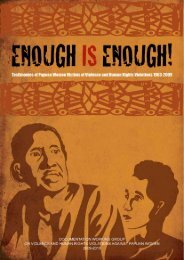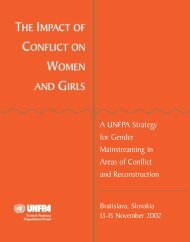Sexual exploitation and abuse by UN peacekeepers - PeaceWomen
Sexual exploitation and abuse by UN peacekeepers - PeaceWomen
Sexual exploitation and abuse by UN peacekeepers - PeaceWomen
Create successful ePaper yourself
Turn your PDF publications into a flip-book with our unique Google optimized e-Paper software.
50<br />
Carlyn van der Mark<br />
Political Science Master Thesis - <strong>Sexual</strong> <strong>exploitation</strong> <strong>and</strong> <strong>UN</strong> <strong>peacekeepers</strong><br />
Section 3 focused on bringing agency to the victims of sexual <strong>exploitation</strong> <strong>and</strong> <strong>abuse</strong>. This<br />
was done <strong>by</strong> discussing the domestic context as a factor that explained for the failure of the<br />
zero tolerance policy. Section 3 aimed to highlight the socio-economic reasons that caused<br />
women <strong>and</strong> teenage girls to engage in survival sex with U.N <strong>peacekeepers</strong>. The U.N refers to<br />
the women <strong>and</strong> teenage girls as victims which takes away their agency. One needs to<br />
underst<strong>and</strong> why women are engaging in survival sex to create an environment where<strong>by</strong> there<br />
is no sexual <strong>exploitation</strong>. Unfortunately it was difficult to test hypothesis III. Nonetheless,<br />
some interesting perceptions were made. The U.N focuses on prevention strategies from an<br />
internal perspective. That means to say there is little resource allocation towards the domestic<br />
context in preventing sexual <strong>exploitation</strong>. Instead section 3 indicated that resource allocation<br />
was directed in preoccupying the <strong>peacekeepers</strong> leisure time. This is not a strategy to enforce<br />
the zero tolerance policy because there is no underst<strong>and</strong>ing of why the zero tolerance policy<br />
is in place.<br />
No thesis is without its limitations. One of the biggest limitations of researching allegations<br />
of sexual <strong>exploitation</strong> <strong>and</strong> <strong>abuse</strong> are that the cases are hidden stories. <strong>Sexual</strong> <strong>exploitation</strong> <strong>and</strong><br />
<strong>abuse</strong> is a difficult subject to address. Some women <strong>and</strong> teenage girls may feel ashamed after<br />
such an act <strong>and</strong> prevent further discussions about the topic. The lack of evidence in cases of<br />
sexual <strong>exploitation</strong> <strong>and</strong> <strong>abuse</strong> makes it even more difficult to address from an institutional<br />
level. Another limitation to the thesis is the lack of information provided <strong>by</strong> the U.N. The<br />
U.N does not publicize which troop contributing country is associated with allegations of<br />
sexual <strong>exploitation</strong> <strong>and</strong> <strong>abuse</strong>. This limits the ability to underst<strong>and</strong> which legal systems have<br />
problems with prosecuting troops involved with sexual <strong>exploitation</strong> <strong>and</strong> <strong>abuse</strong>. Further<br />
research could be done on one specific troop contributing country to investigate the legal<br />
difficulties in implementing a zero tolerance policy. Furthermore, the U.N is now considering<br />
to black-list certain troop contributing countries with allegations of sexual <strong>exploitation</strong> <strong>and</strong><br />
<strong>abuse</strong>. Further research could be done on the implementation of such a ban on peacekeeping<br />
missions <strong>and</strong> the zero tolerance policy.<br />
The difficulty of analyzing the zero tolerance policy from an all rounded perspective is that<br />
each peacekeeping mission is unique. This thesis focused on the DRC <strong>and</strong> Haiti as examples<br />
where<strong>by</strong> the zero tolerance policy fails. However, each domestic context is unique with<br />
different historical backgrounds that explain for women‟s position in society, environmental<br />
circumstances <strong>and</strong> economic position. This makes every domestic context unique with their




![IANSA [PDF, 2MB] - PeaceWomen](https://img.yumpu.com/25206379/1/190x123/iansa-pdf-2mb-peacewomen.jpg?quality=85)
![Commitments Sample [PDF, 93KB] - PeaceWomen](https://img.yumpu.com/25206331/1/190x245/commitments-sample-pdf-93kb-peacewomen.jpg?quality=85)










![A Toolkit for Advocacy and Action [PDF, 260KB] - Peace Women](https://img.yumpu.com/25205989/1/190x245/a-toolkit-for-advocacy-and-action-pdf-260kb-peace-women.jpg?quality=85)